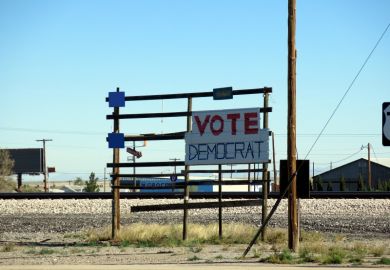The free-college plan promised by US presidential candidate Joe Biden will begin producing more tax revenues than it pays out within 10 years, a Georgetown University study has concluded.
The Biden plan – covering tuition fees for all students at two-year public colleges, and for lower-income students at four-year public institutions – initially would cost some $50 billion (£40 billion) in state and federal revenue.
But a decade later, when the annual costs reached about $70 billion, the added tax revenue from graduates earning higher incomes would begin overtaking and then rapidly exceeding the outlay, Georgetown researchers found.
The finding by Georgetown’s Center on Education and the Workforce is based on the recognition that free-college programmes help not only the beneficiary students but also the wider US economy.
Its calculation – while not formally peer-reviewed – could aid the plan’s chances of enactment if Mr Biden, as projected by polls, should oust Donald Trump in the 3 November presidential election.
Several outside experts said the general range of the Georgetown prediction seemed reasonable, even if the numerous economic and behavioural variables made it difficult to expect any clear outcome of the Biden plan.
The Georgetown study “seems generally sound”, said Jennifer Delaney, an associate professor of higher education at the University of Illinois at Urbana-Champaign, given the well-established links between education, earnings and tax collections.
There were many variables to consider, said Robert Kelchen, an associate professor of higher education at Seton Hall University, as students and colleges engage in a cascading series of reactions to the financial incentives.
Graduate wages also might suffer in relative terms if the country suddenly has many more degree holders, said Sandy Baum, a professor emerita of economics at Skidmore College and an expert on education data and policy at the Urban Institute.
The projection does take into account a variety of such factors that could drive taxpayer costs and benefits, said an author of the report, Anthony Carnevale, a research professor at Georgetown and director of the Center on Education and the Workforce.
Those factors include the possibility that free-college programmes could leave colleges facing less-qualified and underprepared students, and the more likely case that they would get students whose existing barriers were largely financial, he said.
“In previous research,” Professor Carnevale said, “we estimated that there are some 500,000 highly qualified high school students who graduate in the top half of their high school class and yet never attain a college credential.”
Mr Biden offered his plan during the Democratic Party’s primary campaign as a less-aggressive alternative to comprehensive free-college proposals set forth by senators Elizabeth Warren and Bernie Sanders.
His plan would cover the full cost of tuition for all students at community colleges, and for those at four-year public colleges with annual family incomes below $125,000.
Those terms cover about 80 per cent of students at their home-state public institutions, with the federal government paying $2 for every $1 paid by the states. The plan also would let students use government financial assistance for some living costs.
The Georgetown study projected costs for an 11-year period, and did not calculate the point at which the cumulative government investment would be recovered through additional tax revenues.
A graph in the report, however, shows the line representing the projected additional tax revenue climbing sharply upward at the 11th year, while the cost of the plan remains relatively flat.
Register to continue
Why register?
- Registration is free and only takes a moment
- Once registered, you can read 3 articles a month
- Sign up for our newsletter
Subscribe
Or subscribe for unlimited access to:
- Unlimited access to news, views, insights & reviews
- Digital editions
- Digital access to THE’s university and college rankings analysis
Already registered or a current subscriber?








